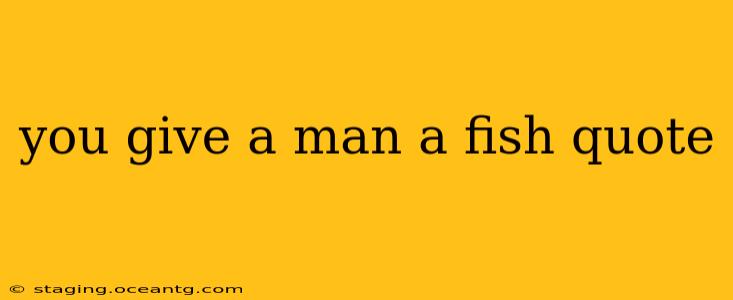"Give a Man a Fish..." and the Power of Sustainable Solutions
The proverb "Give a man a fish, and you feed him for a day. Teach a man to fish, and you feed him for a lifetime" is a timeless adage highlighting the importance of sustainable solutions over temporary fixes. While seemingly simple, its implications are far-reaching and resonate across numerous aspects of life, from personal development to global challenges. Let's delve deeper into the meaning and explore its modern-day relevance.
What Does "Give a Man a Fish" Really Mean?
At its core, the proverb contrasts immediate gratification with long-term empowerment. Giving a man a fish addresses an immediate need – hunger – but offers no lasting solution. The fish provides temporary sustenance, but once consumed, the man is left back where he started, dependent on external aid.
What About "Teach a Man to Fish"?
Teaching a man to fish, on the other hand, equips him with a skill that provides ongoing sustenance. It fosters self-reliance, independence, and the ability to meet his own needs. This empowers him to not only survive but thrive, breaking the cycle of dependence.
Why is This Proverb Still Relevant Today?
This proverb's relevance transcends time because the core principle remains constant: sustainable solutions are superior to temporary fixes. Consider these modern examples:
-
Education: Providing someone with a handout is a short-term solution to financial hardship. Investing in their education equips them with the skills and knowledge to earn a living independently for years to come.
-
Environmental Conservation: Simply cleaning up pollution is a temporary measure. Implementing sustainable practices that prevent future pollution is a far more effective and lasting solution.
-
Economic Development: Offering short-term aid to developing countries may alleviate immediate poverty, but empowering them with sustainable economic strategies fosters long-term growth and self-sufficiency.
-
Personal Growth: Quick fixes for personal problems often provide temporary relief, but addressing the root cause and building resilience leads to lasting change and improved well-being.
How Can We Apply This Proverb in Our Lives?
The proverb challenges us to think critically about problem-solving. Instead of simply addressing symptoms, we should strive to identify and address root causes. This requires:
- Long-term planning: Thinking beyond immediate needs to consider sustainable, lasting solutions.
- Empowerment: Focusing on building skills and capabilities rather than providing solely temporary assistance.
- Education and training: Investing in education and skills development as key components of sustainable solutions.
- Collaboration and community support: Working together to foster sustainable change.
In conclusion, "Give a man a fish" reminds us that true progress lies not in fleeting solutions, but in empowering individuals and communities to become self-reliant and sustainable. By adopting this philosophy, we can create a more equitable and thriving world.
